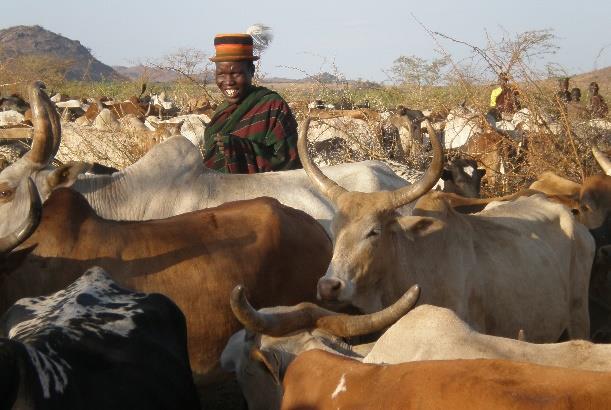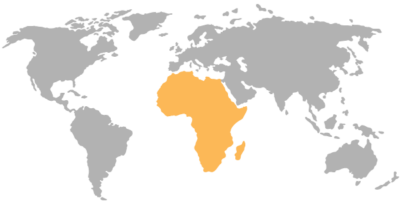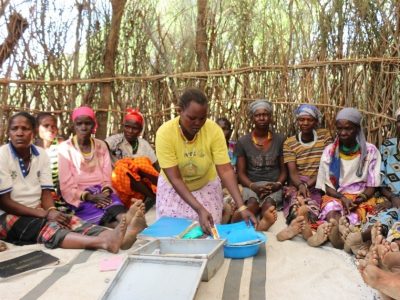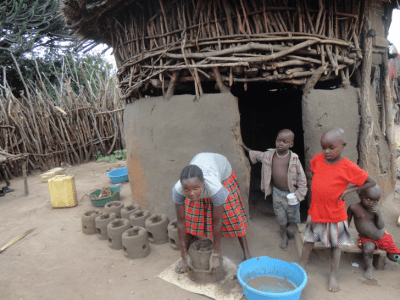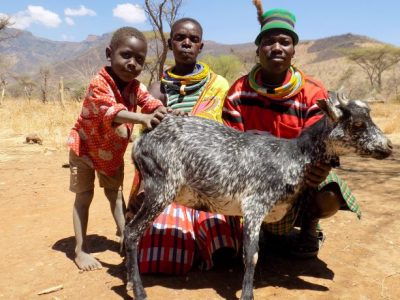The Uganda Karamoja Resilience Support Unit II activity is an Associate Award under the Feed the Future Kenya Livestock Market Systems Activity, a Leader with Associates (LWA) contracting mechanism, held by ACDI/VOCA. This LWA enables USAID missions in the East Africa region to access specialized services. Learn more here.
Background Narrative
Karamoja, a semi-arid region in northeastern Uganda, faces ongoing humanitarian and development challenges, including chronic food insecurity. Although livestock production is vital to the region’s and the country’s economy, its benefits are uneven, and non-livestock income opportunities are scarce. Despite a reduction in inter-communal violence since a 2011 disarmament program, safety and livelihoods remain at risk, while land privatization exacerbates poverty and food insecurity. It is the region in Uganda with the lowest human development and highest poverty indicators in the country.
The first Karamoja Resilience Support Unit (KRSU) program was established to help development and humanitarian actors address these issues through evidence-based analysis. By employing participatory methods, KRSU aimed to better understand local needs and dispel misconceptions about pastoralist systems, showcasing their economic and environmental benefits. The program promoted diversified livelihoods and collaborated with communities to build a peaceful and productive future for Karamoja, aligning with the localization agendas of aid donors.
KRSU II, the second phase of the KRSU program, was a five-year initiative (2019-2024) funded by the United States Agency for International Development (USAID)/Uganda and the Embassy of Ireland as part of the Leader with Associates award granted to ACDI/VOCA. The project was managed by ACDI/VOCA and implemented by its subawardee Tufts University; ACDI/VOCA acted as subaward manager for the implementation of the project. A key element of both phase I and phase II of the program was the intended collaboration with the Government of Uganda (GOU) to strengthen the GOU’s capacity for effective coordination and implementation of development efforts.
Project Objectives
- Turn evidence into action: The program generated and disseminated new evidence, while also reviewing existing research on Karamoja, to guide development planning and decision-making among the GOU, donors, and partners.
- Promote collective action: KRSU II supported coordination among the GOU, development actors, and humanitarian partners by fostering networks, identifying opportunities for collaboration, and enhancing ongoing efforts.
- Improve GOU coordination for development implementation: The program worked to enhance the Ministry of Karamoja Affairs’ ability to coordinate with district and sub-county leadership, focusing on operationalizing the Karamoja Integrated Development Plan III and supporting sustainable investment.
Project Activities & Approaches
KRSU II saw impactful change across the Karamoja region through its evidence-based interventions, strategic collaborations, and targeted capacity-building initiatives. Over the five years, the program:
- Strengthened evidence-based decision-making: KRSU II worked to translate research into actionable strategies. The program produced over 25 research studies and reports that have directly influenced local policies and projects, including the design of the Karamoja Integrated Development Plan III and national strategies for foot and mouth disease control.
- Enhanced technical support and collaboration: The program fostered strong collaborations with a range of stakeholders, including the Karamoja Development Partners Group (KDPG), USAID, government ministries, non-governmental organizations, and academic institutions. These partnerships facilitated the development of key policy documents, such as the Karamoja Integrated Development Plan, and the Uganda Peace Policy, and supported strategic initiatives, like the Karamoja Resilience Strategy.
- Promoted collective action: Through consistent engagement with the KDPG and other regional platforms, KRSU II hosted numerous learning and knowledge-sharing sessions. These sessions addressed critical issues, such as conflict resurgence, food insecurity, and gender disparities, and fostered a coordinated approach among stakeholders.
- Improved capacity-building and knowledge dissemination: The program delivered targeted training on pastoralism, livestock management, and humanitarian responses, reaching a wide range of actors including policymakers, local leaders, and community members. KRSU II’s research findings were disseminated through workshops, seminars, and innovative platforms, like radio broadcasts in local languages.
Achieved Project Results
Over the life of the Activity, KRSU II, through Tufts University, reached 506 individuals and accomplished the following:
- Research and dissemination: KRSU II published 14 research and assessment reports, along with 13 evidence briefs addressing various resilience issues in Karamoja.
- Community engagement: Findings were effectively disseminated at the community level through:
- Six radio talk shows and 14 radio spot messages aired over two months.
- Three panel discussions involving 21 community leaders, including representatives from women’s groups, youth groups, and local traders.
- District coordination: KRSU II facilitated and documented deliberations from over 40 district-level coordination meetings across different sectoral platforms.
- Karamoja Development Partners Group (KDPG) meetings: A total of 49 KDPG meetings were convened and documented, promoting collaboration among stakeholders.
- Learning sessions: KRSU II organized 61 special learning sessions for KDPG members, covering a range of resilience topics.
- Ad hoc visits: KRSU II offices in Kampala and Moroto hosted 65 visits from international non-governmental organizations, donors, and academic institutions and provided valuable advice on policies and programming in Karamoja.
- High-level participation: KRSU II team members participated in 12 high-level events as panelists, presenters, and moderators, enhancing visibility and influence.
- Online engagement: The KRSU II website received over 11,117 views in four years, reflecting growing interest in resilience topics.
Project Leadership

Project Director: Lucas Valente da Costa
lvalentedacosta@acdivoca.org

Project Associate: Kate Fraser
kfraser@acdivoca.org

